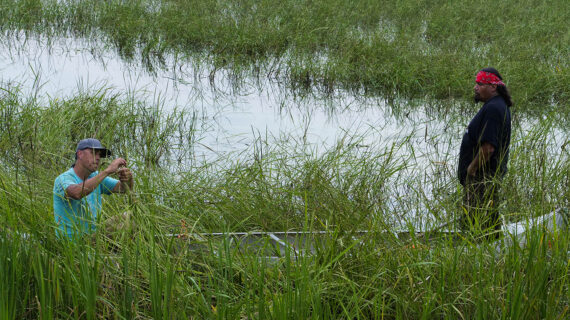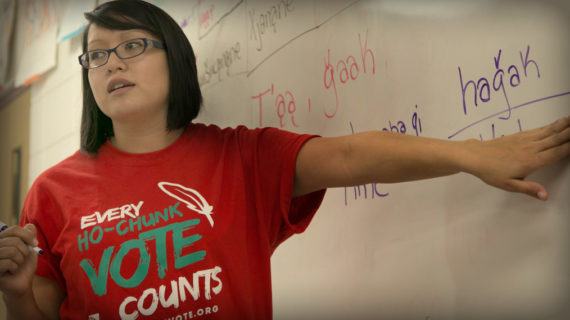Frederica Freyberg:
Just before the April election, we reported on the rise of school districts around the state going to referendum for operating expenses. In February and April, voters approved 41 operating referenda, the biggest being the $252 million a year for Milwaukee Public Schools. But a number of districts saw their requests denied by voters. The two school districts we profiled, Fort Atkinson and Richland, both saw theirs passed. “Here & Now” senior political reporter Zac Schultz tells us they both used the same method to make their referenda look more appealing to voters promising them the tax increase wouldn’t cost them anything.
Zac Schultz:
In the runup to election day, the Fort Atkinson School District held a public information session on the referendum.
Kory Knickrehm:
The upcoming operational referendum provides the district to use funds differently.
Zac Schultz:
The district was telling voters the operational referendum would let them levy an additional $6.5 million a year for three years to avoid more cuts but it was promising voters it would not result in a tax increase.
Man:
I just want to make sure that I have the figures straight because I’m still having trouble relating.
Zac Schultz:
There was a lot of confusion.
Man:
I’m afraid I don’t understand that connection.
Zac Schultz:
Here is the amount Fort Atkinson receives from property taxes. Fort Atkinson could promise a $6.5 million increase for the next three years wouldn’t raise taxes because they’d already increased their levy by $7 million the year before to prepay an old construction loan. It’s called defeasance and it’s one of the only ways a district can increase their spending limits without permission from voters or the state. If the operating referendum passed, they would go back to paying their normal debt payment in future years. Defeasance is essentially prepaying debt to avoid interest. District administrator Rob Abbott says after their operating referendum failed the prior two years, the school board decided to raise their levy to prepaid debt.
Rob Abbott:
The idea of defeasance or prepaying debt is difficult for people to understand but definitely is a strategy that is a long-term benefit to the taxpayer. In our case, it equates to around $3.4 million in savings of interest over the term of those 20-year bonds.
Zac Schultz:
But the school board members clearly didn’t want to say they had already raised taxes on their own. They described it as needing voter approval to reallocate funds.
Robynn Selle:
Now we’re saying we need the money to be able to maintain the current programming we have. We can’t use that funding over there that we use to prepay the debt.
Zac Schultz:
It really wasn’t sinking in.
Man:
Of that prepaid $7 million one-time payment, you’re seeking permission to shift $6.5 million three times.
Nathan Knitt:
We are levying the same dollar amount over each year, approximately but we’re just shift — we’re reallocating based on voter permission.
Another Man:
It doesn’t matter whether we vote yes or no because you are still going to — you’re still going to just move it around.
Woman:
No, they can’t. They can’t move it around. They need our permission.
Rob Abbott:
Even in our best efforts to be as simple or to be as concrete as possible when talking about school finance, it’s still very, very difficult for people to understand how all of that works.
Zac Schultz:
In the Richland School District, an increase in state aid a couple years ago would have meant a drop in the tax rate.
Steve Board:
We wanted to stabilize that mill rate and then use that to prepay some of our existing debt.
Zac Schultz:
District administrator Steve Board says the school board decided to use defeasance to keep the rate the same.
Steve Board:
As a result, we have taken an $8.7 million debt and we’ve cut it down to just under $4 million in just a couple of years.
Zac Schultz:
That allowed them to sell their referendum as tax neutral as well.
Steve Board:
So then we’ve been able to use that gap to do this operational referendum essentially at a zero tax impact.
Zac Schultz:
Both district administrators say the use of defeasance to set up their operating referendum was key to passage.
Rob Abbott:
This isn’t a referendum we can live without so we are forced to create an effort that will hopefully be as successful as possible in passing a referendum.
Zac Schultz:
Richland’s operating referendum passed by 139 votes. Fort Atkinson’s passed by just 79 votes. Some of their neighboring districts didn’t have the same results. Voters in the Mauston School District rejected their operating referendum by 480 votes. Voters in the Jefferson School District rejected theirs by 685. Both Mauston and Jefferson were asking for less money than their neighbors but each of those came with a tax increase. So should we expect to see more districts using defeasance of capital debt in order to make an operating referendum look tax neutral?
Steve Board:
A district can only do that if they have referendum debt out there for capital improvements that they are taking out bonds on and then they can use that defeasance strategy as way to help stabilize the mill rate.
Rob Abbott:
But I think for other districts, if they are not passing an operational referendum, the only other way they can keep that tax rate stable or where it had been is to prepay debt, if they have debt. But of course when districts run out of debt, that opportunity evaporates as well.
Zac Schultz:
Reporting from Fort Atkinson, I’m Zac Schultz for “Here and Now.”
Search Episodes
Related Stories from PBS Wisconsin's Blog

Donate to sign up. Activate and sign in to Passport. It's that easy to help PBS Wisconsin serve your community through media that educates, inspires, and entertains.
Make your membership gift today
Only for new users: Activate Passport using your code or email address
Already a member?
Look up my account
Need some help? Go to FAQ or visit PBS Passport Help
Need help accessing PBS Wisconsin anywhere?

Online Access | Platform & Device Access | Cable or Satellite Access | Over-The-Air Access
Visit Access Guide
Need help accessing PBS Wisconsin anywhere?

Visit Our
Live TV Access Guide
Online AccessPlatform & Device Access
Cable or Satellite Access
Over-The-Air Access
Visit Access Guide
 Passport
Passport
















Follow Us